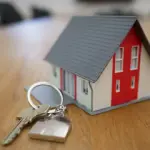
It’s very tempting when you find the perfect house to seal the deal with an offer over asking price.
But when should you offer over the asking price on a house? You should only offer over the asking price if you’ve done your research and consider the house to be worth the offer over and you can afford to buy it at that price. You shouldn’t offer over asking price if there are no other offers already on the table.
Please also read this article to discover how you could save £71,475 on your next mortgage if you sell your house and rent before buying again. Even I was amazed when I did the calculations!
What are the risks and consequences of offering over asking price on property?
There are a number of risks and potential consequences of offering over asking price.
The risks of offering over asking price on a house are as follows:
- The mortgage valuation may be lower than your offer over the asking price on the house.
- You may have to put up a bigger deposit if the house doesn’t value up to your offer.
- It could cost you valuation costs and legal fees to walk away from the house purchase.
- You may pay more than you can afford to buy the house.
- You will pay more in Stamp Duty if you over over asking price on the house.
Let’s take a look at these in more detail.
1. The mortgage valuation may be lower than your offer over the asking price on the house
There’s always the risk that the mortgage valuation could be lower than what you’ve agreed to pay for the house. But this risk is greater if you’ve agreed to pay over asking price (see example of how this works below).
If the mortgage valuer agrees with the estate agent’s original value, or worst still values it even lower, your mortgage offer may not be high enough for you to afford to buy the property.
Which leads onto the next point.
2. You may have to put up a bigger deposit if the house doesn’t value up to your offer
If the mortgage valuation is lower than your offer over asking price, it will mean your mortgage offer will be lower than you had originally planned for.
As a result of a lower mortgage offer, you will either have to increase your deposit to cover the difference. Or you will need to renegotiate the price you pay for the house. However, the seller may not entertain a lower offer, which means you may have to withdraw from the deal.
This leads on nicely to the next point about costs.
3. It could cost you valuation costs and legal fees to walk away from the house purchase
If you are at the point of a mortgage valuation you have already incurred costs. At this stage you will have at least incurred the cost for the mortgage valuation. On top of that you will likely have incurred some of your legal fees and very likely the search costs.
To walk away at this point may be hard to do as it has already cost you. But you may not have a choice if you simply don’t have the additional deposit monies to cover the shortfall.
4. You may pay more than you can afford to buy the house
Be careful when buying a house that you don’t get over enthusiastic about what you offer. This is a mistake that’s often made by first time buyers. Often times people get so excited to find a house they love that they get carried away with their offer.
It’s a good idea to step back and consider what you doing. Make sure you’ve done your research on the area and on this type of house.
5. You will pay more in Stamp Duty if you pay over asking price on the house
As a result of paying more than the asking price, you’ll pay more in Stamp Duty.
But also, you may take the house purchase price into the next Stamp Duty threshold. If this happens, you could end up paying even more in stamp duty than you might if you only pay asking price or less.
So be careful of where your offer takes you with the Stamp Duty thresholds.
It’s always worth knowing that sellers don’t always go for the highest offer in their home
Sellers don’t always accept the highest offer on their house. The highest bid might be from a buyer who’s not even sold their own house yet. Sellers are always advised to consider all offers in a multi-offer situation, not just the highest one.
Top of the list of strong-buyers are those who are a cash buyer. Second in line is a buyer who doesn’t have a house to sell, but who requires a mortgage. This second type of buyer is still technically a cash buyer. They are also in a much stronger position than someone who has a house to sell, because they are not in a conveyancing chain.
That’s not to say you should discount an offer over asking price from someone who’s in a sales-chain.
But you need to weigh up the risks of going for an amount over asking price from a person who’s in a sales chain vs having piece of mind from accepting a lower offer from someone who is more proceedable.
When is it likely that buyers offer over asking price?
If you have been doing your research in the area you may come across a house that is under valued. This does happen sometimes where estate agents get the house value wrong.
If you’ve done your research and find a house that’s been valued at under market value, this is a good time to offer over asking price.
But you only really need to do this if there are other interested parties. But if no one else is offering on the property, you may not need to offer over asking price in any event.
In this situation if you are the first to offer, don’t offer over asking price, but offer slightly under asking price or exactly at the asking price.
Another situation you’ll find properties going for over asking price is in a strong sellers market. If the demand is higher than the supply of houses, this is when you find houses selling for over list price. It is during these property booms when house prices get pushed up.
It’s also when gazumping happens and offers already accepted get rejected for another higher offer.
What can you do if your mortgage valuation is lower than your offer over asking price?
If your mortgage offer comes in at below your offer you have a few options. These include the following:
- Look for another mortgage company.
- Renegotiate the price you’re paying for the property.
- Walk away from the deal.
- Ask friends or family to help with the extra deposit required to still buy the house.
Let’s take a look at each of these in more detail.
1. Look for another mortgage company
It might be the first mortgage company got the valuation wrong. But be careful with this, as the estate agent already valued it lower than your offer over asking.
You may also look for a mortgage lender that will offer a higher loan to value at the lower valuation, which will allow you to still buy the house.
The problem with this solution is there will be a delay in the buying process and the seller may be annoyed. But also, you may not get as favourable terms on interest rates with a higher loan to value mortgage.
2. Renegotiate the price you’re paying for the property
If the valuation comes in at below your offer over asking price you always have the option to renegotiate the price. However, the seller will not be best pleased to be messed around.
The challenge will be if they accepted your offer out of a number of other offers that were at or around the same offer price that you originally agreed to pay.
3. Walk away from the deal
As already explained above, if you simply can’t afford the house with the lower mortgage offer, you may have to walk away. This may have cost you the valuation fee and legal fess to this stage, but it’s better to walk away now than to stretch yourself too much and regret this later.
4. Ask friends or family to help with the extra deposit required to still buy the house
Be careful with this option. Whilst you can seek help to raise the extra deposit from family or friends, you don’t want to put yourself in the situation where you can’t afford to pay the lender of the extra deposit back.
Example of the numbers if the mortgage valuation comes in at under the offer over asking price
I thought it would be helpful to explain with an example of how a mortgage valuation at under your offer price may work in practice.
Example house purchase:
- House on the market at £200,000.
- Your offer over asking price is £215,000.
- Your mortgage lender’s terms are to lend at 75% loan to value.
- This would require a deposit, if the house values up at £215,000, of £53,750.
- Assume that the mortgage valuation comes in at £200,000.
With the above example of an offer over asking price of £215,000, and with the valuation coming in at £200,000, your mortgage offer would be £150,000 (i.e. £200,000 x 75%). This is instead of what you’d hope for of £161,250 (i.e. £215,000 x 75%).
This means that if you still buy the house at £215,000 and don’t renegotiate the price, you need a deposit of £65,000 (i.e. £215,000 – £150,000). This is an extra £11,250 (i.e. £65,000 – £53,750).
Please also read this article to discover how you could save £71,475 on your next mortgage if you sell your house and rent before buying again. Even I was amazed when I did the calculations!
I hope you’ve got something from reading this article about when should you offer over the asking price
If you’ve got something from this article about “when should you offer over the asking price” please share it on your favourite social media site.
Also, if you have any questions, please feel free to comment below too. Alternatively, if you need more help, please feel free to contact us on our contact us page here. Or join the discussion and ask your question in the property forum.




